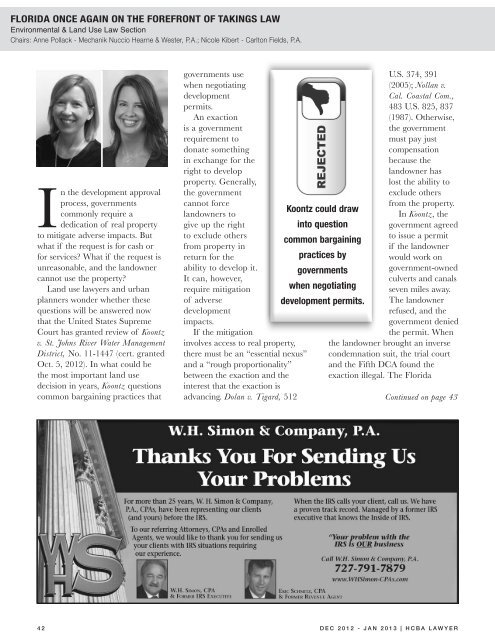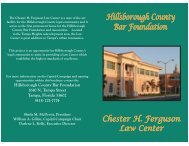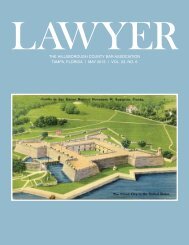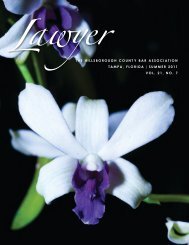december 2012 - Hillsborough County Bar Association
december 2012 - Hillsborough County Bar Association
december 2012 - Hillsborough County Bar Association
Create successful ePaper yourself
Turn your PDF publications into a flip-book with our unique Google optimized e-Paper software.
FLORIDA ONCE AGAIN ON THE FOREFRONT OF TAKINGS LAW<br />
Environmental & Land Use Law Section<br />
Chairs: Anne Pollack - Mechanik Nuccio Hearne & Wester, P.A.; Nicole Kibert - Carlton Fields, P.A.<br />
governments use<br />
when negotiating<br />
development<br />
permits.<br />
An exaction<br />
is a government<br />
requirement to<br />
donate something<br />
in exchange for the<br />
right to develop<br />
property. Generally,<br />
the government<br />
cannot force<br />
landowners to<br />
give up the right<br />
to exclude others<br />
from property in<br />
return for the<br />
ability to develop it.<br />
It can, however,<br />
require mitigation<br />
of adverse<br />
development<br />
impacts.<br />
If the mitigation<br />
involves access to real property,<br />
there must be an “essential nexus”<br />
and a “rough proportionality”<br />
between the exaction and the<br />
interest that the exaction is<br />
advancing. Dolan v. Tigard, 512<br />
U.S. 374, 391<br />
(2005); Nollan v.<br />
Cal. Coastal Com.,<br />
483 U.S. 825, 837<br />
(1987). Otherwise,<br />
the government<br />
must pay just<br />
compensation<br />
because the<br />
landowner has<br />
lost the ability to<br />
exclude others<br />
from the property.<br />
In Koontz, the<br />
government agreed<br />
to issue a permit<br />
if the landowner<br />
would work on<br />
government-owned<br />
culverts and canals<br />
seven miles away.<br />
The landowner<br />
refused, and the<br />
government denied<br />
the permit. When<br />
the landowner brought an inverse<br />
condemnation suit, the trial court<br />
and the Fifth DCA found the<br />
exaction illegal. The Florida<br />
In the development approval<br />
process, governments<br />
Koontz could draw<br />
commonly require a<br />
dedication of real property<br />
into question<br />
to mitigate adverse impacts. But<br />
common bargaining<br />
what if the request is for cash or<br />
for services? What if the request is<br />
practices by<br />
unreasonable, and the landowner<br />
governments<br />
cannot use the property?<br />
Land use lawyers and urban<br />
when negotiating<br />
planners wonder whether these<br />
development permits.<br />
questions will be answered now<br />
that the United States Supreme<br />
Court has granted review of Koontz<br />
v. St. Johns River Water Management<br />
District, No. 11-1447 (cert. granted<br />
Oct. 5, <strong>2012</strong>). In what could be<br />
the most important land use<br />
decision in years, Koontz questions<br />
common bargaining practices that Continued on page 43<br />
42 DEC <strong>2012</strong> - JAN 2013 | HCBA LAWYER









